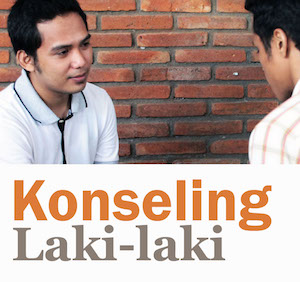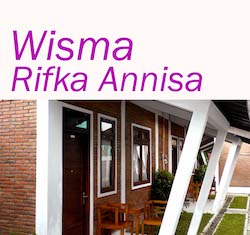Rifka Annisa undertakes research, establishes support and education programs, and trains communities to deal with gender-based violence. With all this knowledge and expertise, Rifka Annisa also compiles books on how to understand gender, the role of Islam, Indonesian law and the way we run our programs. These small books provide valuable insight into the work we do and address many frequently asked questions from people wondering about the issues of violence against women in Indonesia.
Book 1: Understanding Gender and Violence Against Women

This book explains what gender is and how rigid gender roles lead to a culture that accepts and perpetuates violence against women. Gender is different to biological sex, as the different anatomies we have hold no inherent meaning. Contrastingly, gender is an assigned construction of rules that drastically affect how people live their lives. Common stereotypes of male and female include women staying at home, being passive and being more emotional while men work outside the home, are assertive and are seen as rational. These expected behaviours of people with different physical anatomy are something humans have created, and it severely restricts the rights of women. From marginalising them economically to restricting their participation in social and political life, women constantly receive fewer opportunities than men. Women also statistically experience more domestic violence from men close to them. From Rifka Annisa’s research, we estimate that on the island of Java a woman is raped every 5 hours.
Not only do women experience more violence, but victim-blaming, and the stereotyping and shaming of women who are assaulted is a common practice in Indonesian culture (and in most cultures all over the world). Women are seen as wanting attention, and teasing men with how they dress or what they were doing. If the violence occurs within their household, people ask why the woman stayed, and blame her assault on her ‘choice’ to stay with an abusive husband. In reality, regardless of clothing or behaviour, women are still assaulted, raped and abused by men. Further, providing for their children, economic dependence, psychological trauma and threats from their partners often restrict women from simply leaving an abusive household or situation. This fear and stigma that their community will not believe them or blame them for being abused is a huge problem in addressing the issue of gender-based violence – especially as it removes responsibility of abuse from the man/perpetrator.
Understanding Gender and Violence Against Women is the perfect book for an articulate explanation of how gender and violence influence each other, and how we need to think more critically about our current culture.
Book 2: Is Islam Discriminatory?

Islam overwhelmingly emphasises equality for all, with a responsibility to all of humanity to be charitable and peaceful. However, masculinist and patriarchal interpretations of the Al Qur’an are often quoted to justify gender inequality. Muslims who use Islam to maintain gender roles and even violence against women, are violating the basic tenant of sharia, i.e. maslahat (benefit, well being).Believing that men are better leaders or that women are taking rights from ‘outside’ of those given to them in Islam, they ignore the vast amount of teachings that emphasise equality for all. The fact that rights for women have been ignored within the Muslim community for so long shows an ignorance and biased perception of Islam used to benefit men.
Islamic laws and teachings that are explicitly sexist towards women do exist, such as the need for two women to testify versus one man. What Rifka Annisa emphasises is that these laws were written 14 centuries ago, at a time when women were even more oppressed. The Al-Qur’an and other Islamic writings are very gender progressive for the time in which they were written, however there are some parts that reflect the context of that society. As Muslims who are currently practicing Islam in the 21st Century it is important to study what is relevant in today’s society. Gender equality, equal relations between wife and husband, the application of logic and the process of learning are vital to our understanding of Islam.
Islam itself is not discriminatory, however patriarchal Muslim communities can use the Al-Qur’an and other Islamic texts to oppress women. Therefore, it comes down to changing cultural and social attitudes, and focusing on the most important principles of Islam such as equality.
3. Why Allow Differences?

Gender roles are a socialised phenomena created by humans, they are not natural – particularly in terms of education, skills etc. Many people believe that gender roles are genetic because of long cultural traditions perpetuated by the community, the government and other systems.
A commonly asked question is that if gender roles work in harmony and create a good relationship between men and women in a community, is that still harmful? An important feature of equality is choice. Do people have the choice to act outside of gender roles, even if those gender roles work in harmony in that community? If they cannot choose to have different opportunities, then inequality is still be an issue.
The best way to address inequality is to begin educating people with curriculums that are non-sexist. From children to adults, it is important to start teaching gender equality within our communities. Government policy must also strive to be gender-aware, particularly in acknowledging the struggles of women and history of sexism.
Book 4: Justice For Who?

The Indonesian legal system is currently still unequal in its treatment of women. It is particularly limited in protecting them from violence, rape, exploitation and domestic abuse. Sexual assault legislation is often only applicable to cases of pre-marital assault, which makes it very difficult for married women who are raped by their husbands to get legal help. Conviction and sentencing also shows that men usually face no legal consequences for domestic violence as police, courts and society make coming forward and providing evidence very difficult. Additionally, poor women often do not have the time or money for lawsuits.
Divorce is legally accessible to all women in Indonesia, for Muslims through the Religious Court and for non-Muslims through the State Court. However women who are not yet married, also face complex issues. After having sexual intimacy, their partners might threaten to break up with them or refuse to marry them. This kind of coercive behaviour is unhealthy and abusive. Rifka Annisa advocates that all women should prioritise their safety over the idea of their virginity. Virginity is a social construct used to control women and abuse should not be put up with because of fears about virginity. Pregnancy outside of marriage is another common issue with a variety of options: getting married and raising the baby, raising the child as a single parent, putting the baby up for adoption or having an abortion. Islamic teachings are not consistent as to when life begins. Some sources quote conception, some 40 days and others 120 days – however abortion can be an option at any time that is best for the woman, and Rifka Annisa can organise this medical help.
Overall, the legal system is often a complicated and biased process for women however Rifka Annisa does offer legal support to any women survivors of domestic violence.
Book 5: Organising Ourselves

Rifka Annisa’s program for establishing Crisis Centres based in the community is one of our most successful ways of addressing violence against women in rural areas of Central Java. The program established in Bupati KDG Tc. II Gunung Kidul is an example of how Rifka Annisa based its Crisis Centre in the community so that the program became self-sustaining without outside help from Rifka Annisa’s main office in Jogja.
The first step is understanding what areas might be the most in need of a women’s crisis centre. While research has shown that all communities regardless of background have cases of domestic violence, there are some indicators as to areas with a larger domestic violence issue. These indicators include a high youth marriage rate, high divorce rate, high mortality rate for mothers and babies, high female suicide rate and high recordings of murders by and of women. After choosing an area, the internal systems and external systems that can be involved in a case of domestic violence should be identified. Internal systems include the victim and perpetrator, their families, neighbours and community. External systems include the hospital, police and the women’s crisis centre.
Rifka Annisa then focuses on putting together resources for changing the socialisation of gender, providing psychological and legal counselling and community organising in the region. A secretariat is also needed to keep documents from domestic violence cases. By working with the community, cooperating with people in the internal systems and making the benefits very clear, programs like a women’s crisis centre are more likely to be accepted. In the community of Tc. II Gunung Kidul, Rifka Annisa gave volunteers from the community a series of workshops, 10 days of work experience at the Rifka Annisa office in Jogja and helped them start running the women’s crisis centre in their community. These volunteers were organised into three groups, counsellors, educators and accountability/law keepers. The counsellors were trained in psychology and legal support, the educators were given gender awareness programs and the accountability groups were usually made up of village leaders and local government. In this way the women’s crisis centre in Gunung Kidul became independent and ran effectively on its own once Rifka Annisa stepped away.This is the model Rifka Annisa uses in many areas of Central Java to help women facing domestic violence in rural areas. []
Author: Bridget Harilaou (Alamat email ini dilindungi dari robot spam. Anda memerlukan Javascript yang aktif untuk melihatnya.)
Student intern in the Media and Public Relation Division, Rifka Annisa







